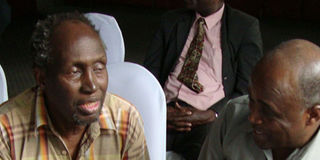Ngugi to be feted on 50th anniversary of first novel

Kenya’s veteran writer and Nobel Prize for Literature front-runner Ngugi wa Thiong’o (left) is set to be feted at home next month. The East African Educational Publishers will host the celebrated author during a ceremony to mark 50 years of his first novel, Weep Not, Child. PHOTO| HUGHOLIN KIMARO| NATION MEDIA GROUP
What you need to know:
- Ngugi has been widely mentioned as Africa’s favourite contender for this year’s Nobel Prize. The Nobel Committee will unveil the winner around the time the Ngugi fete at home will be held
- Most of his novels such as Weep Not, Child, The River Between, A Grain of Wheat and Petals of Blood have been used as literature set texts in educational institutions across Africa, although they were considered “risky” works in Kenya at one time
Kenya’s veteran writer and Nobel Prize for Literature front-runner Ngugi wa Thiong’o is set to be feted at home next month.
The East African Educational Publishers will host the celebrated author during a ceremony to mark 50 years of his first novel, Weep Not, Child.
The book was published in 1964, a year after Kenya attained independence.
It explores the injustices perpetrated by the colonial government on Kenyans, especially regarding their ancestral land.
Ngugi has been widely mentioned as Africa’s favourite contender for this year’s Nobel Prize. The Nobel Committee will unveil the winner around the time the Ngugi fete at home will be held.
During the ceremony, Ngugi, who teaches at the University of California, Irvine, US, is expected to introduce his four children, who are also published authors, in what may appear a succession gesture.
They are Mukoma, Wanjiku, Nducu and Tee.
Since Weep Not, Child came out, Ngugi has published numerous novels, plays, short stories, essays, autobiographies and children’s books.
Most of his novels such as Weep Not, Child, The River Between, A Grain of Wheat and Petals of Blood have been used as literature set texts in educational institutions across Africa, although they were considered “risky” works in Kenya at one time.
Ngugi’s writings, which are tinged with Marxist views, drew the ire of the administration of both President Jomo Kenyatta and President Daniel arap Moi, leading to his detention in 1977 and flight to exile in 1982.




